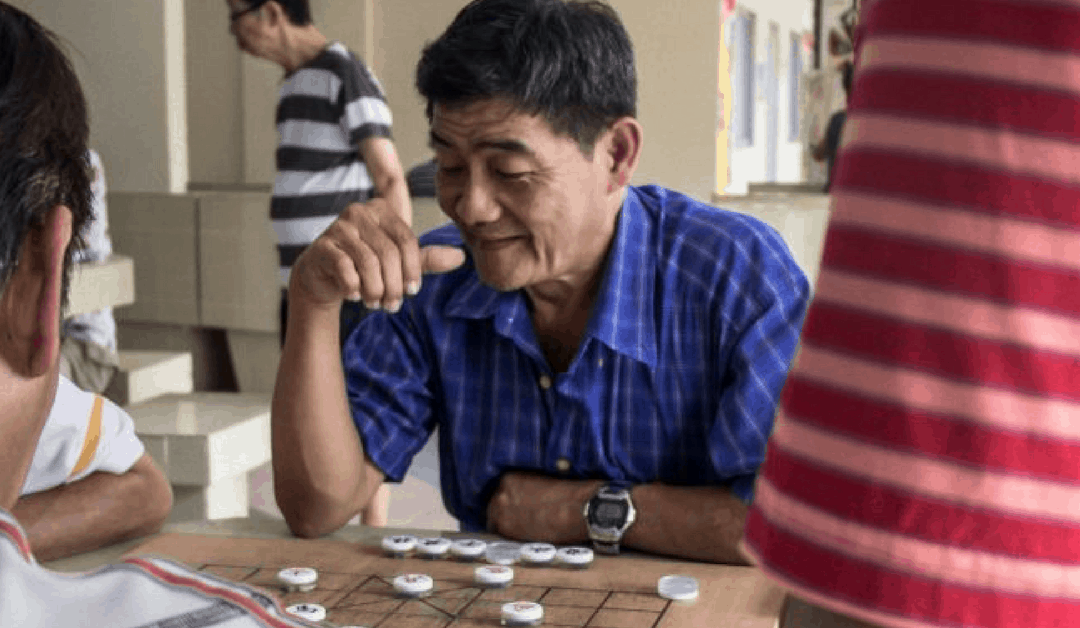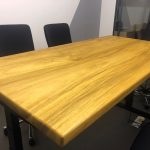At the heart of Chong Pang, Yishun uncles from all walks of life have bonded over the game of Chinese chess. Most do not exchange contacts, but know where to find each other — at the Nee Soon Residential Corner, located at Block 701 Yishun Avenue 5.
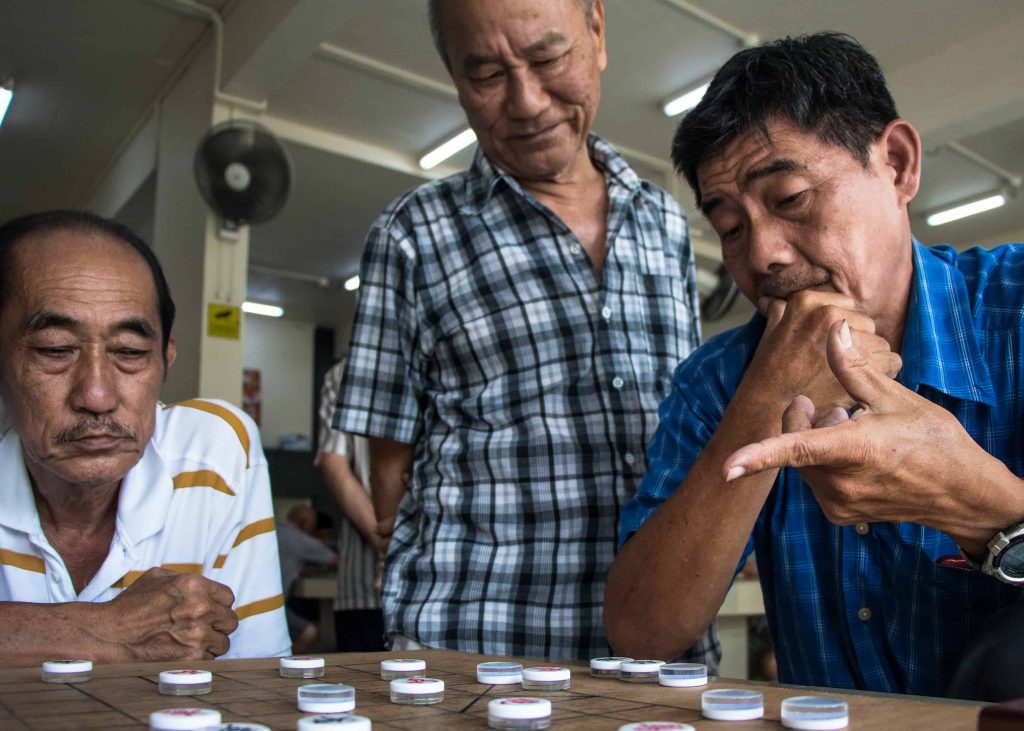 Since its establishment, the Residential Corner has undergone two renovations to add a toilet, a television set and sitting benches.
Since its establishment, the Residential Corner has undergone two renovations to add a toilet, a television set and sitting benches.
By June 2016, it was re-established as a hub for chess enthusiasts in the neighbourhood, according to chairman of the Yishun constituency chess club, Mr William Yeo, 73.
For Mr Yeo, he hopes to cultivate genuine connections with fellow residents, and improve their well-being while at it. “I want to invigorate the minds of the elderly,” he said. “When people get old, they need something to keep them thinking.”
A Simple Game
The corner also attracts residents from beyond Yishun, and has become a sanctuary for elderly men to enjoy chess and the company of their friends.
Most of the players are retirees who find chess an affordable and convenient way to fill up their pockets of time in the day.
One such player is retiree Yong Lie, 73, who plays Chinese chess up to four times a week. He said in Mandarin: “When you’re old, there’s not much money to pursue other hobbies. Chess is free – it’s free entertainment.”
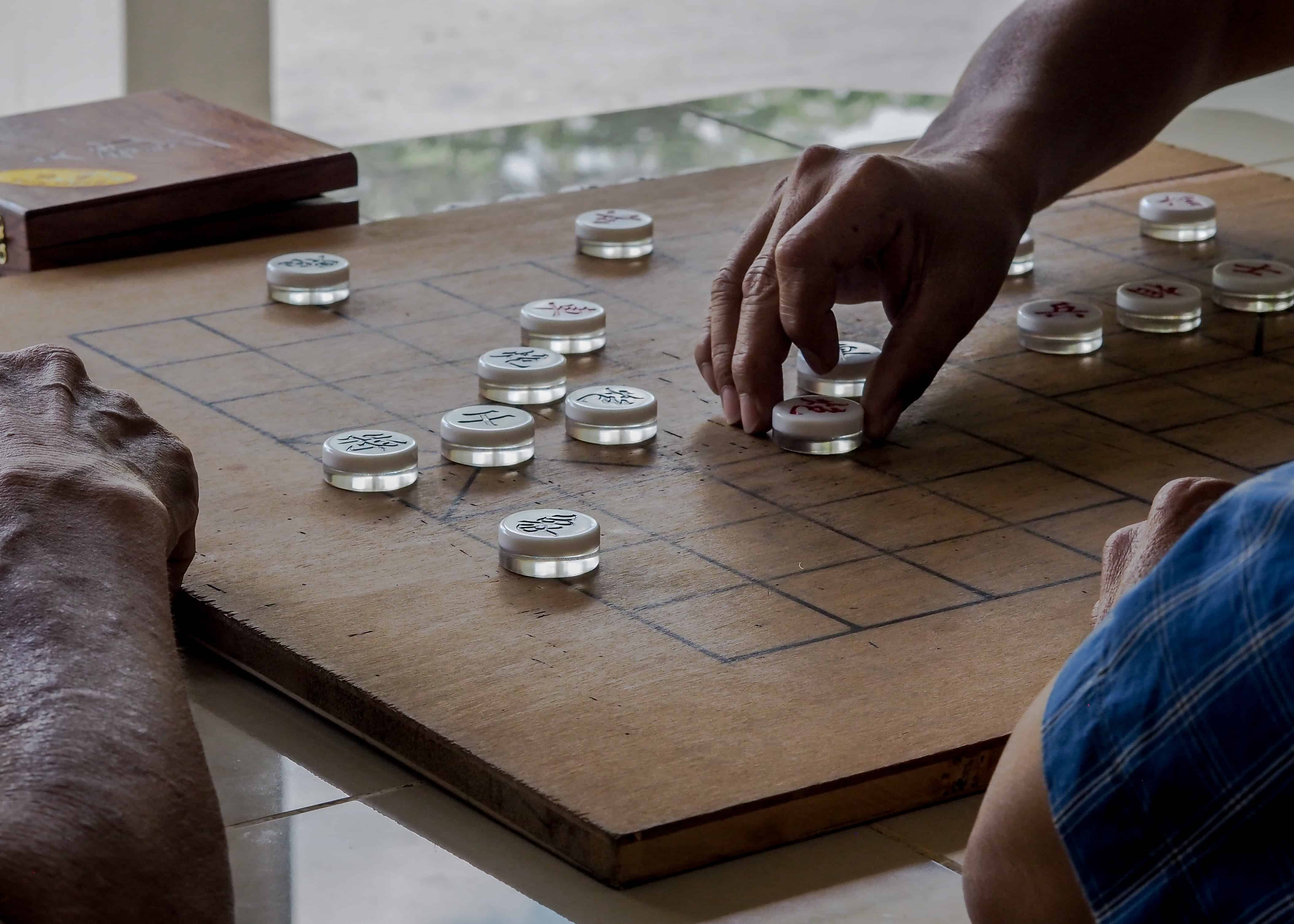
Although the Nee Soon Residential Corner attracts enthusiastic spectators and players daily, its crowd reaches its peak on weekends and public holidays.
The unofficial chess community is not publicised through official channels, but word has travelled fast within the neighbourhood.
“Those who know chess will know this place, because there are (chess) players here,” said Mr Chua Swee Huat, 64.
“Most of us here come to kill time and engage our minds. You could say it (chess) has become one of those simple joys in life.”
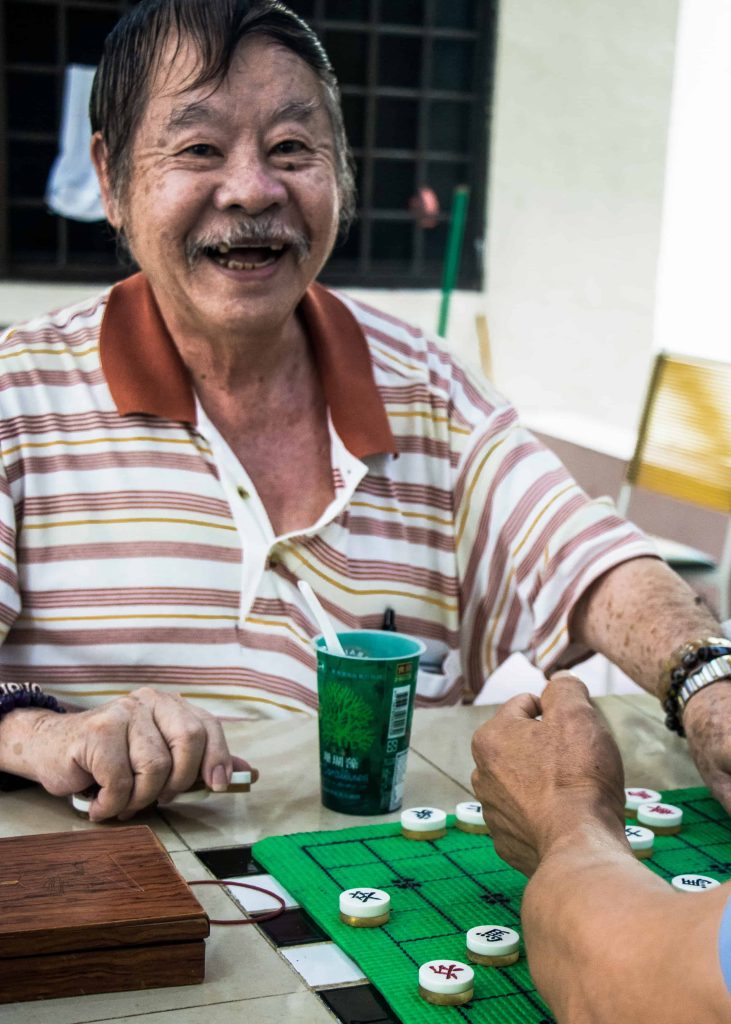
Chairman of the Yishun constituency chess club William Yeo, 73, helped establish the Nee Soon Residential Corner in 2016. A former infantry officer of 23 years, he now exercises his military strategies on the chess board.
Mr Yeo visits the chess corner up to six days a week to spar with fellow residents and take care of the chess boards and tiles.
“Old people like me need to play games to stimulate the mind. What’s important is to be alert!” said Mr Yeo, as he alternates between his next move and a cup of seaweed jelly, which he claims helps with vitamin deficiencies.
A Blind Move
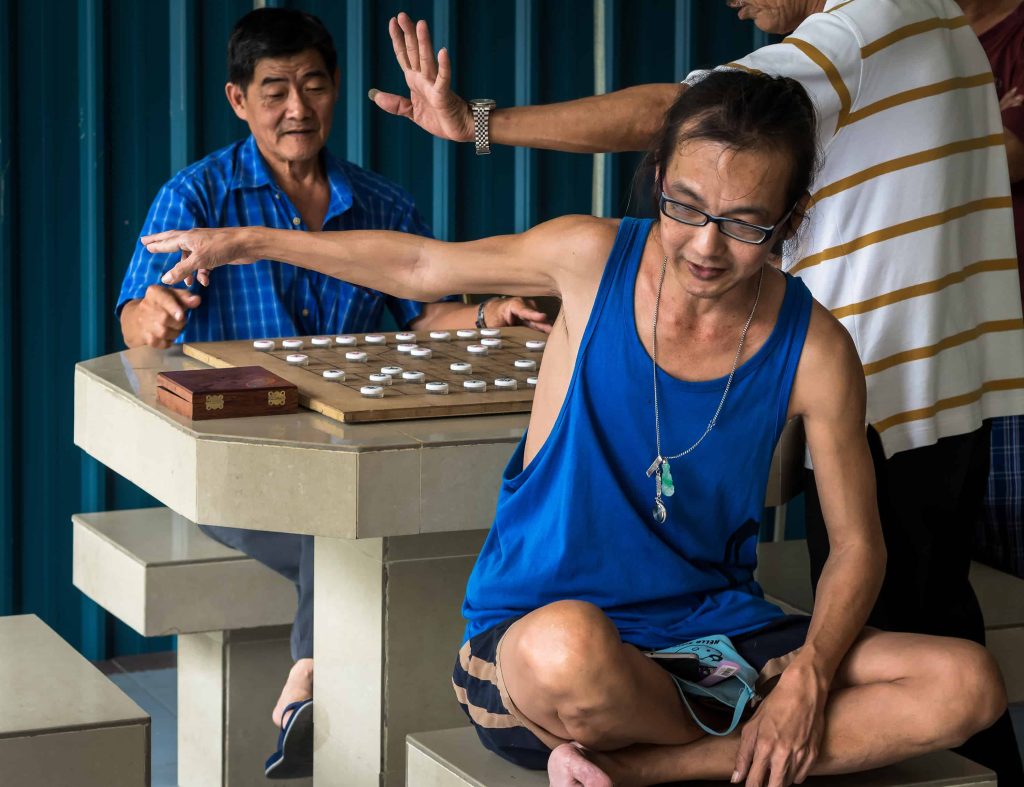
Among the sea of balding heads and silver hair, it is easy to spot a slightly younger chap with his hair tied up in a man bun.
Heralded as Jiao Lian, or coach, former national player Xiong Guo Wei, 47, is the only professional Chinese chess player in the arena. During his 12 years in the team, he earned a third-place win for Singapore in the Chinese Chess Asian Cup in Sarawak.
Besides helping Mr Yeo with taking care of the chess sets, he now also coaches the Chinese chess team at Yishun Town Secondary School four times a week.
“As you get older, it is difficult to focus on so many things. I chose to focus on teaching instead of competing. Teaching is about opening up the students’ minds.”
Facing away from the chessboard, Mr Xiong calls out the pieces and their movements while Mr Chua assists with moving the chess pieces.
This is a traditional variant of Chinese chess, known as blind chess, where players are handed shuffled tiles and play by memory.
Despite the handicap, Mr Xiong’s strategies lead him to a win against Mr Jiang Zheng Ji.
Mr Jiang, however, is not fazed by his loss. He shared that Mr Xiong once gave him a software to play against an artificial intelligence (AI) bot, to train up his strategies. “I never beat it, but it is good to practice more,” the 64-year-old said.
It’s Just A Game
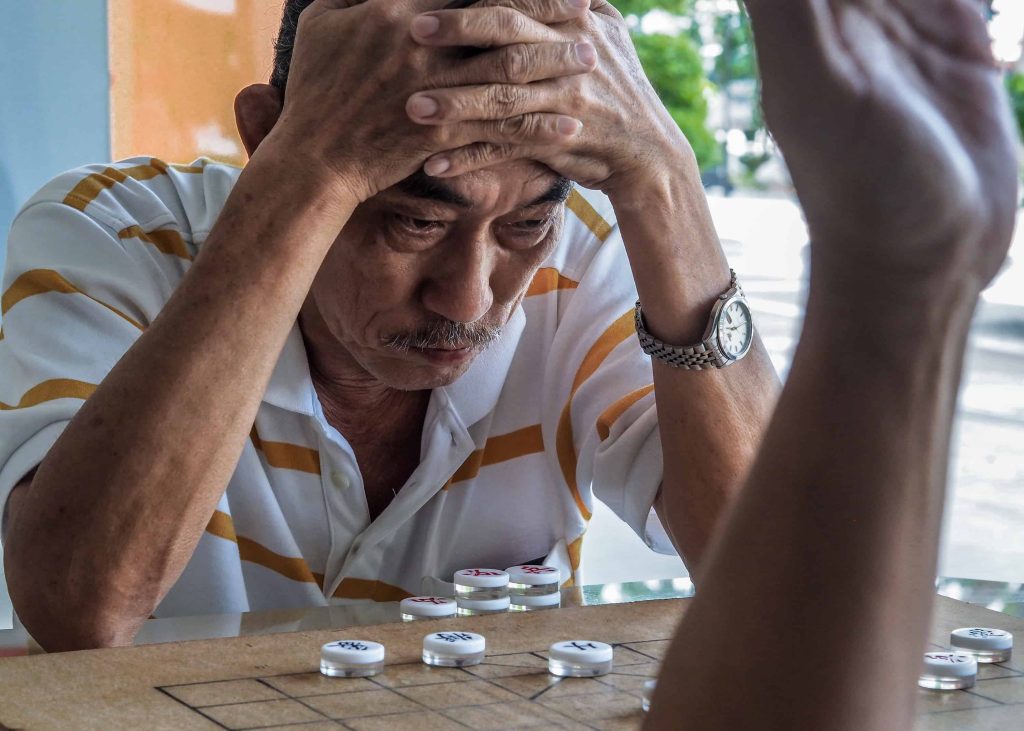
Chess does more than stimulate the mind for Mr William Yeo. It was the platform through which he met one of his oldest friends, cleaner Chua Swee Huat (above), 64.
Known for his strategies that mainly uses the “horse” for offensive moves on the board, Mr Chua is nicknamed Lao Ma, or old horse by regulars. The pair first met over a game of chess more than 30 years ago that saw Mr Yeo take home the win.
Mr Chua makes time for chess on weekends and public holidays, when he does not have to work.
Asked if he took the game seriously, Mr Chua waved his hands in denial. “The people here play chess for leisure. We come down here to pass time. Winning and losing is just part of life. I don’t take it too seriously,” he said.
He added: “Never teach your children chess, if not they’ll become obsessed with playing and not amount to anything much in life.”
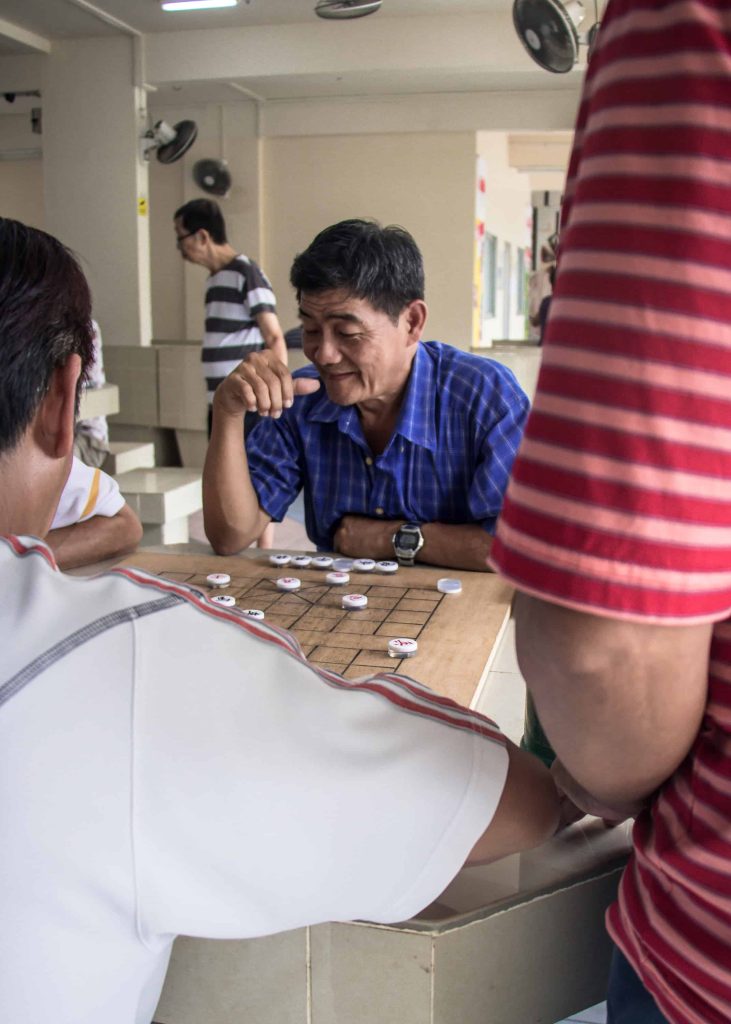
Mr Jiang Zheng Ji, 64, nicknamed Lao Jiang, or old general, is another familiar face at the Residential Corner.
Despite living in Woodlands, Mr Jiang, who works as a delivery man, goes out of his way for chess whenever he knocks off early and on weekends. As a representative for the chess club in Yishun, Mr Jiang has participated in several nationwide competitions and came in 20th out of 50 places.
He believes it is important to pursue things he enjoys so that he has something to look forward to.
Over the years spent in the chess club, Mr Jiang has seen members come and go. “Sometimes, a regular member stops coming for a consecutive few weeks,” he sighed. “Then we take notice and we find out that he has gone to see the light.”
“Sometimes, I miss them.”
This photo story is written by Clarissa Lim and Clive Sin from This Is Yishun, a photo exhibition organised by students from the Wee Kim Wee School of Communication and Information.


